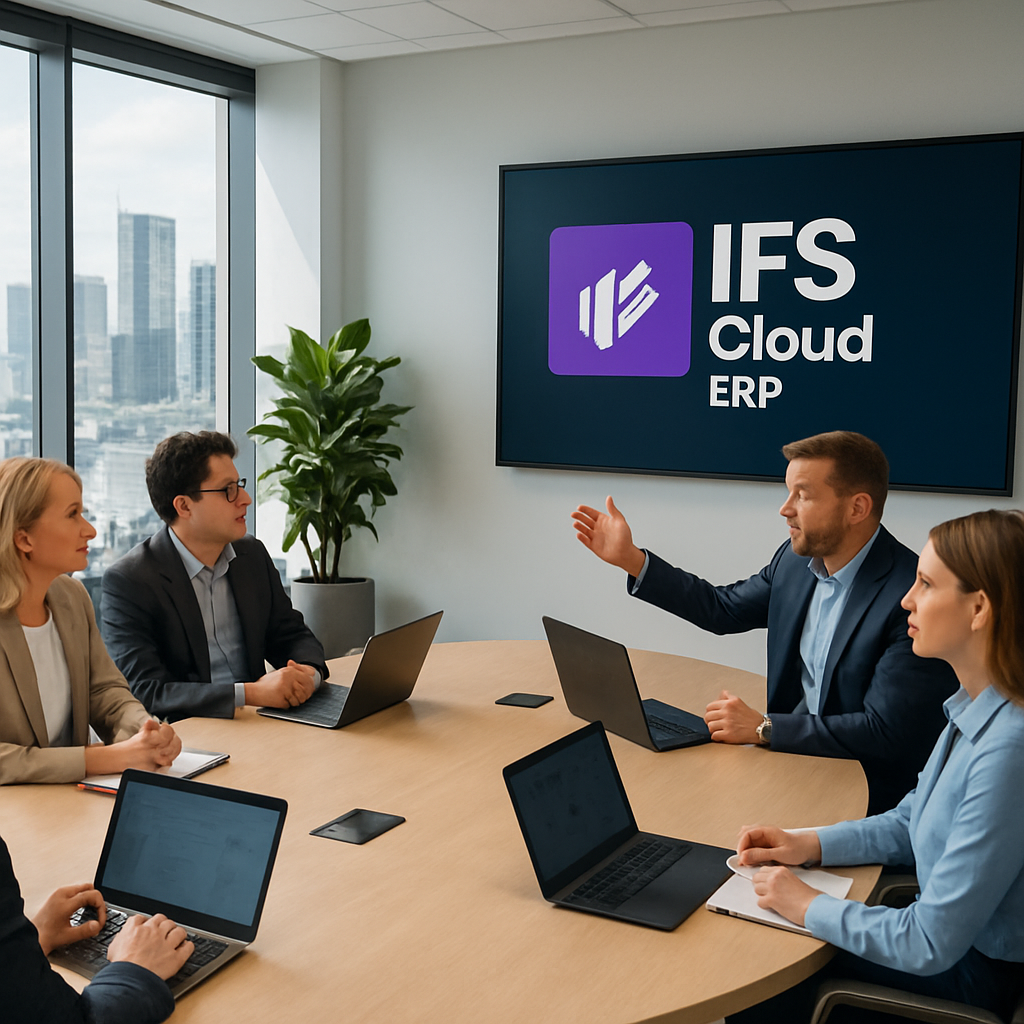Unlocking Success: Why the Best IFS Partner Matters in 2026
Effective business management hinges on efficiently handling complex operations, and IFS Cloud ERP offers a robust solution designed to meet these...
9 min read
 Blake Snider
:
Nov 20, 2025 12:00:00 AM
Blake Snider
:
Nov 20, 2025 12:00:00 AM
Choosing the right IFS partner for your ERP implementation is crucial for your business's efficiency and growth. With numerous options available, how can you ensure you make the best choice? This blog will guide you through the top 10 questions to ask potential IFS partners. These questions will help you understand their experience, capabilities, and approach, ensuring you select a partner who can successfully drive your ERP project and provide long-term support.
TL;DR: When evaluating potential IFS partners, it's essential to understand their experience with IFS ERP implementations. Look for partners with a proven track record across various industries, strong consulting and technical teams, and a structured project management approach. Request case studies and references to evaluate their reliability and success in similar industries. Ensure they have a thorough process for understanding your business requirements, integrating with existing systems, effective data migration and customization strategies, and comprehensive training and support services. Additionally, inquire about their continuous improvement methodology and transparent pricing models. Selecting the right partner, like Astra Canyon Group, ensures a smooth and successful IFS ERP implementation tailored to your business needs.
When evaluating potential IFS partners, it's essential to understand their experience with IFS ERP implementations. An experienced partner should have a track record of successful projects across various industries, showcasing their ability to adapt to different business needs. Ask about the number of implementations they've completed, the types of businesses they've worked with, and any notable successes or case studies. This will help you gauge their capability to manage complex projects and deliver results suited to your requirements.
Inquire about the expertise of their consulting and technical teams. A strong IFS partner should have a team of project managers, business analysts, and technical experts proficient in IFS ERP modules. Knowing the team's composition and experience levels will help you assess their ability to handle the technical and business aspects of your implementation. Look for partners who invest in continuous training to stay current with IFS updates and best practices.
Lastly, ask about their approach to project management and support. Experienced IFS partners should have a structured methodology for implementation, including thorough planning, risk management, and clear communication channels. They should also offer robust post-implementation support to ensure the ERP system runs smoothly. Understanding their process for handling issues and their commitment to long-term support will give you confidence in their reliability throughout the ERP lifecycle.
When selecting an IFS partner, it's important to request case studies or references from similar industries. These examples show the partner's ability to deliver successful ERP implementations in environments like yours. A partner with relevant experience will better understand your industry's challenges and requirements, leading to a more tailored and effective ERP solution. Reviewing case studies reveals how the partner has helped other businesses achieve their goals, highlighting their problem-solving skills and strategic approach.
Additionally, obtaining references from previous clients lets you hear firsthand about their experiences with the partner. This feedback provides a realistic view of the partner's reliability, communication, and ability to meet deadlines. Asking references about the partner’s strengths and areas for improvement helps you assess whether their working style aligns with your company’s culture and expectations. Positive testimonials and detailed case studies from satisfied clients indicate the partner's competence and dedication to customer success.
Reviewing case studies and speaking with references also helps gauge the partner’s consistency in delivering high-quality results. Look for patterns of success across multiple projects and industries, as this suggests a strong and adaptable implementation methodology. A partner who can demonstrate a history of achieving significant business improvements through their IFS ERP solutions is more likely to replicate that success in your organization. This due diligence ensures you choose a partner who understands your industry and has a proven track record of delivering substantial value for their clients.
Understanding your business requirements is essential for a successful IFS ERP implementation. Ask potential partners about their approach to this process. A reliable partner should start with a thorough assessment of your current operations, challenges, and goals. This involves detailed interviews with key stakeholders, reviewing existing processes, and analyzing current systems. By understanding your business deeply, the partner can tailor the ERP solution to meet your specific needs.
Next, inquire about how they document and prioritize your requirements. Effective partners will use structured methodologies, such as business process mapping and gap analysis, to identify areas for improvement and align the ERP functionalities with your business goals. They should clearly explain how they will translate your requirements into actionable plans within the IFS ERP framework. This ensures the solution is customized to your needs and scalable for future changes.
Finally, discuss their strategy for ongoing communication and collaboration throughout the project. A competent partner will establish regular checkpoints and updates to keep the project aligned with your evolving requirements. They should encourage continuous feedback and be flexible in adjusting the plan as needed. This collaborative approach helps address any emerging challenges promptly and ensures the ERP solution remains effective and relevant to your business. By choosing a partner with a well-defined and transparent approach to understanding your requirements, you can ensure a smoother and more successful ERP implementation.
Ensuring seamless integration with your existing systems is crucial for a successful IFS ERP implementation. When evaluating potential partners, ask about their integration approach. A competent partner will start with a comprehensive assessment of your current IT landscape, identifying critical systems and processes that need to be integrated. They should have a proven methodology for mapping these systems, understanding data flows, and pinpointing potential integration challenges. This initial analysis is essential for creating a detailed integration plan that minimizes disruption and maximizes efficiency.
Inquire about the tools and technologies they use to facilitate integration. Experienced partners will leverage advanced integration platforms and middleware to ensure data consistency and smooth communication between the new ERP system and your existing applications. They should be skilled in using APIs and other integration technologies to connect different systems. By employing robust integration tools, the partner can help ensure that data is accurately synchronized across all platforms, enabling seamless operations and real-time data access.
It's important to ask about their approach to testing and validation during the integration process. A thorough partner will implement rigorous testing protocols to verify that all systems are properly connected and functioning as intended. This includes conducting end-to-end testing, user acceptance testing, and performance testing to identify and resolve any issues before going live. They should also provide ongoing support to address any post-implementation integration challenges. By choosing a partner with a meticulous and proactive approach to integration, you can ensure a smooth transition to your new ERP system without compromising the performance of your existing systems.
When considering potential IFS partners, it's essential to understand their methodology for managing ERP implementation projects. A well-defined project management methodology ensures the implementation is structured, efficient, and aligned with your business goals. Ask potential partners to outline their approach, starting from the initial planning phase. They should have a clear roadmap with key milestones, deliverables, and timelines. This structured approach helps set realistic expectations and provides a framework for monitoring progress throughout the project.
Inquire about their process for risk management and issue resolution. A competent partner will proactively identify potential risks and develop mitigation strategies to address them. They should have a robust system for tracking and resolving issues that arise during the implementation, including regular risk assessments, contingency planning, and a clear escalation path for critical issues. Effective risk management ensures the project stays on track and minimizes disruptions to your business operations.
Finally, ask about their approach to communication and collaboration. Transparent and frequent communication is vital for a successful ERP implementation. The partner should establish regular update meetings, progress reports, and feedback loops to keep all stakeholders informed and engaged. They should also foster a collaborative environment where your team feels comfortable sharing insights and concerns.
Handling data migration and system customization effectively is crucial for a smooth IFS ERP implementation. When evaluating potential IFS partners, it's important to understand their approach to these tasks. Start by asking about their data migration strategy. A competent partner will conduct a thorough analysis of your existing data to identify what needs to be migrated. They should have a detailed plan that includes data extraction, cleansing, transformation, and loading (ETL). This ensures your data is accurately and efficiently transferred to the new ERP system with minimal disruption to your operations.
In addition to data migration, inquire about their process for system customization. Every business has unique needs, and a one-size-fits-all ERP solution may not be sufficient. A reliable partner will work closely with you to understand your specific requirements and tailor the system accordingly. They should be experienced in configuring the IFS ERP to match your workflows, business processes, and reporting needs. This includes customizing user interfaces, workflows, and reports to ensure the system supports your daily operations effectively.
Lastly, discuss their approach to testing and validation of both data migration and system customization. Rigorous testing is essential to ensure the migrated data is accurate and that the customized system functions as intended. The partner should implement a comprehensive testing plan that includes unit testing, system integration testing, and user acceptance testing. By validating the accuracy of data and the effectiveness of customizations, they can identify and resolve issues before the system goes live. This meticulous approach ensures a smoother transition and a more reliable ERP system tailored to your business needs.
To ensure a successful ERP implementation with IFS, it's essential to understand the training and support services offered by potential partners. Start by asking about their training programs. A good training plan should be tailored to different user roles within your organization, ensuring everyone has the knowledge to use the new ERP system effectively. The partner should provide a mix of training methods, including hands-on workshops, online courses, and detailed documentation to suit various learning styles.
Next, inquire about their post-implementation support services. Continuous support is vital to address any issues or questions after the system goes live. Ask if they offer 24/7 support, dedicated account managers, and a clear escalation process for critical issues. Reliable partners will also conduct regular system health checks and updates to keep your ERP system optimized and aligned with your business needs. They should proactively identify potential problems and offer solutions to maintain smooth operations.
Make sure to discuss their approach to continuous improvement and updates. A strong IFS partner will support your current implementation and assist with future upgrades. They should offer services to keep you updated with new IFS features and best practices, ensuring your ERP system evolves with your business. This includes periodic reviews, user feedback sessions, and tailored recommendations for system improvements. Choosing a partner committed to ongoing training and support ensures your team remains proficient and your ERP system continues to deliver value.
When evaluating potential IFS partners, it's important to understand how they measure success and ensure continuous improvement. A competent IFS partner will have a structured approach to success metrics aligned with your business goals. They should provide concrete examples of key performance indicators (KPIs) used to track project milestones, user adoption, and overall system performance.
Continuous improvement is key in a successful IFS partnership. A reliable partner won’t consider their job done once the system is live. They will commit to ongoing optimization and support, regularly reviewing system performance and user feedback to identify areas for enhancement. This ensures the ERP system evolves with your business needs, adapting to changes and incorporating new features or processes.
An effective IFS partner will emphasize a collaborative relationship, working closely with your team to foster a culture of continuous improvement. They should offer training and resources to empower your staff, enabling them to fully leverage the ERP system. Regular check-ins, performance reviews, and feedback sessions are essential to promptly address issues and ensure the system consistently adds value to your business operations.
When evaluating potential IFS partners, it's crucial to understand their pricing models and contract terms. A trustworthy partner will have transparent and flexible pricing structures, clearly explaining how costs are determined. Whether through a subscription model, one-time license fees, or a combination of both, it’s important to know what is included, such as implementation, training, support, and any hidden fees.
Contract terms are equally important. Look for partners who offer flexibility in contract duration, renewal options, and exit strategies. Understanding the terms surrounding service level agreements (SLAs) is essential, as they outline the expected performance and availability of the ERP system. Clear contract terms ensure aligned expectations and mechanisms for addressing issues that arise during the partnership.
A good IFS partner will also offer scalable pricing models that can grow with your business. They should provide options for scaling up or down based on your evolving needs without punitive costs. This scalability ensures that your investment remains aligned with your business’s size and requirements, making the ERP solution sustainable in the long term.
Choosing Astra Canyon Group as your IFS partner offers several advantages, starting with our comprehensive support throughout the entire IFS ERP adoption lifecycle. Our experienced business consultants and technical experts work closely with your team to understand your specific requirements and tailor solutions to align with your strategic goals. From initial selection to integration and ongoing refinement, our commitment ensures your ERP system is optimized for maximum efficiency.
Our proven track record distinguishes us from other IFS partners. We have successfully guided numerous businesses through complex ERP implementations, consistently delivering projects on time and within budget. Our proactive and adaptive approach allows us to anticipate and address challenges before they become issues. This dedication to high-quality service and customer satisfaction has earned us a reputation for reliability and expertise.
Additionally, Astra Canyon Group prioritizes continuous improvement and long-term partnership. We don’t just implement your ERP system and leave; we provide ongoing support and optimization to ensure the system evolves with your business. Our training programs empower your team to fully utilize the IFS ERP, and our regular performance reviews help identify enhancement opportunities. This commitment ensures your investment in IFS Cloud ERP continues to deliver value well into the future.
In 2026, a partner who only understands "basic" ERP is already behind. You need to ask: "How will you help us deploy AI Agents to automate our workflows?"
According to Gartner’s latest forecast, 40% of enterprise applications will feature task-specific AI agents by 2026. Your partner should be able to explain their roadmap for integrating IFS.ai capabilities into your daily operations, moving you beyond simple automation to true autonomous decision-making.
Choosing the right IFS partner is crucial for a successful ERP implementation and business growth. By asking the right questions, you can assess potential partners' experience, methodologies, and support services to ensure they meet your needs. A partner like Astra Canyon Group offers comprehensive support throughout the IFS ERP adoption lifecycle, a proven track record of successful implementations, and a commitment to continuous improvement. This careful selection process will lay the foundation for a successful ERP project that delivers long-term value to your business.
Reach out to Astra Canyon Group to explore the full potential of IFS. Together, you can ensure your digital transformation goes beyond technology, achieving your strategic vision with the right partner by your side.

Effective business management hinges on efficiently handling complex operations, and IFS Cloud ERP offers a robust solution designed to meet these...
.png)
Choosing the right IFS ERP consultant is vital to the success of your IFS implementation. You need a IFS consulting team who is knowledgeable and...

This blog post introduces the vital role certified IFS partners play in implementing and optimizing IFS Cloud ERP systems. Their certification...